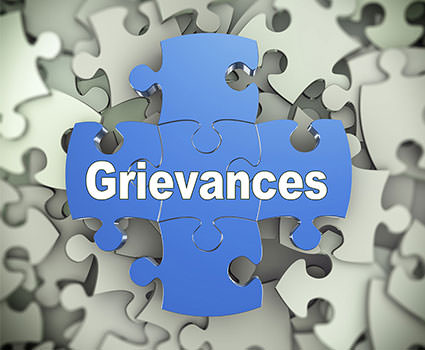Disciplinaries and Grievances
Your employer will ideally have clear policies and procedures in place, perhaps contained in a Staff Handbook, setting out the way that it will handle disciplinary and grievance issues.
Your employer is actually obligated to give you information about its disciplinary and grievance procedures within 2 months of your employment starting – see our guide to Employment Contracts / Policies / Staff Handbooks.

The ACAS Code
Both employers and employees are expected to follow the procedures set out in the ACAS Code of Practice on Disciplinary & Grievance Procedures (‘the Code’) and Employment Tribunals must take the Code into account, where relevant, when considering claims.
The Code is supported by the ACAS guide, which offers more detailed practical guidance, developed from unfair dismissal case law, on complying with the requirements of the Code.
If an Employment Tribunal finds that either party unreasonably failed to comply with the Code, they may adjust any award made by up to 25% as a penalty.
Key Principles of Disciplinaries and Grievances
The key principles as set out by the Code are as follows: 
- Procedures should be set out in writing;
- Specific examples of behaviour that an employer is likely to treat as gross misconduct should be cited (e.g. theft, violence);
- Parties should act consistently;
- Issues should be raised promptly and addressed in a reasonable timescale;
- Reasonable investigations should be carried out;
- Employees should be provided with full details of any issues and given a reasonable opportunity to respond;
- Employees should be allowed to be accompanied to formal meetings;
- The outcomes of meetings should be confirmed to employees in writing within a reasonable timescale;
- Employees should be allowed to appeal against any formal decisions.
The Procedures
 This is a summary of the recommended procedures:
This is a summary of the recommended procedures:
Disciplinary Procedure
- A reasonable investigation into the background facts should be carried out;
- If the employer decides to proceed with formal disciplinary action, it should write to the employee to invite him to a disciplinary hearing, providing full details of the alleged misconduct (including any supporting evidence, such as witness statements taken during the investigation) and warning him of the potential disciplinary sanction(s).
- The employee should be given a reasonable timeframe in advance of the disciplinary hearing to consider the allegations and any evidence and prepare their case;
- A disciplinary hearing should be held to put the allegations to the employee and to listen to their response;
- The employee has a statutory right to be accompanied to the disciplinary hearing by a work colleague or a trade union representative;
- The employer must confirm its decision to the employee in writing following the disciplinary hearing, and give them the right to appeal;
- A further meeting should be held to consider any appeal, which should (if possible) be chaired by someone who was not involved with the earlier stages of the process;
- The employee also has a statutory right to be accompanied to the appeal hearing by a colleague or a trade union representative;
- The employer must confirm its final decision to the employee in writing following the appeal hearing.
Grievance Procedure
 Grievances should be raised by employees in writing;
Grievances should be raised by employees in writing;- A formal grievance meeting should be held to investigate the issues;
- The employee has a statutory right to be accompanied to the grievance meeting by a work colleague or trade union representative;
- The employer must confirm its decision to the employee in writing following the grievance meeting, including details of any action it will take to resolve the issues;
- The employee should be given the right to appeal the decision;
- A further meeting should be held to consider any appeal, which should (if possible) be chaired by someone who was not previously involved;
- The employee also has a statutory right to be accompanied to the appeal meeting by a colleague or a trade union representative;
- The employer must confirm its final decision to the employee in writing following the appeal meeting.
Please Get In Touch
Our specialist advice in these situations will enable you to understand your legal rights and to have a plan in mind as you proceed. This is in place so that you can lever yourself into the strongest possible negotiating position, either with regards to negotiating a severance package, or to ensure that you are in the strongest possible position if it becomes necessary to issue proceedings in the Employment Tribunal against your employer.
If you need any assistance in this area, please contact a member of our team.

